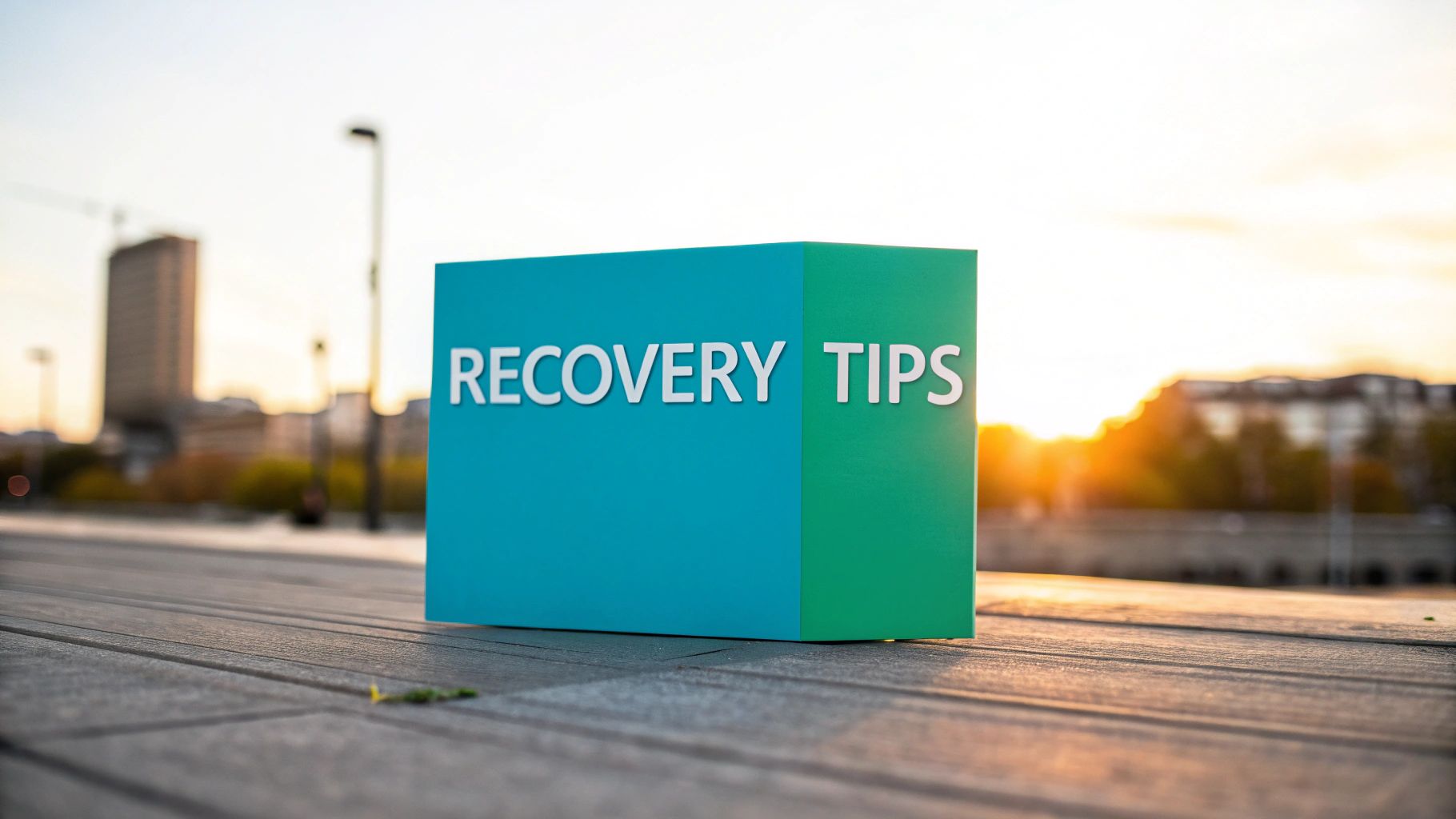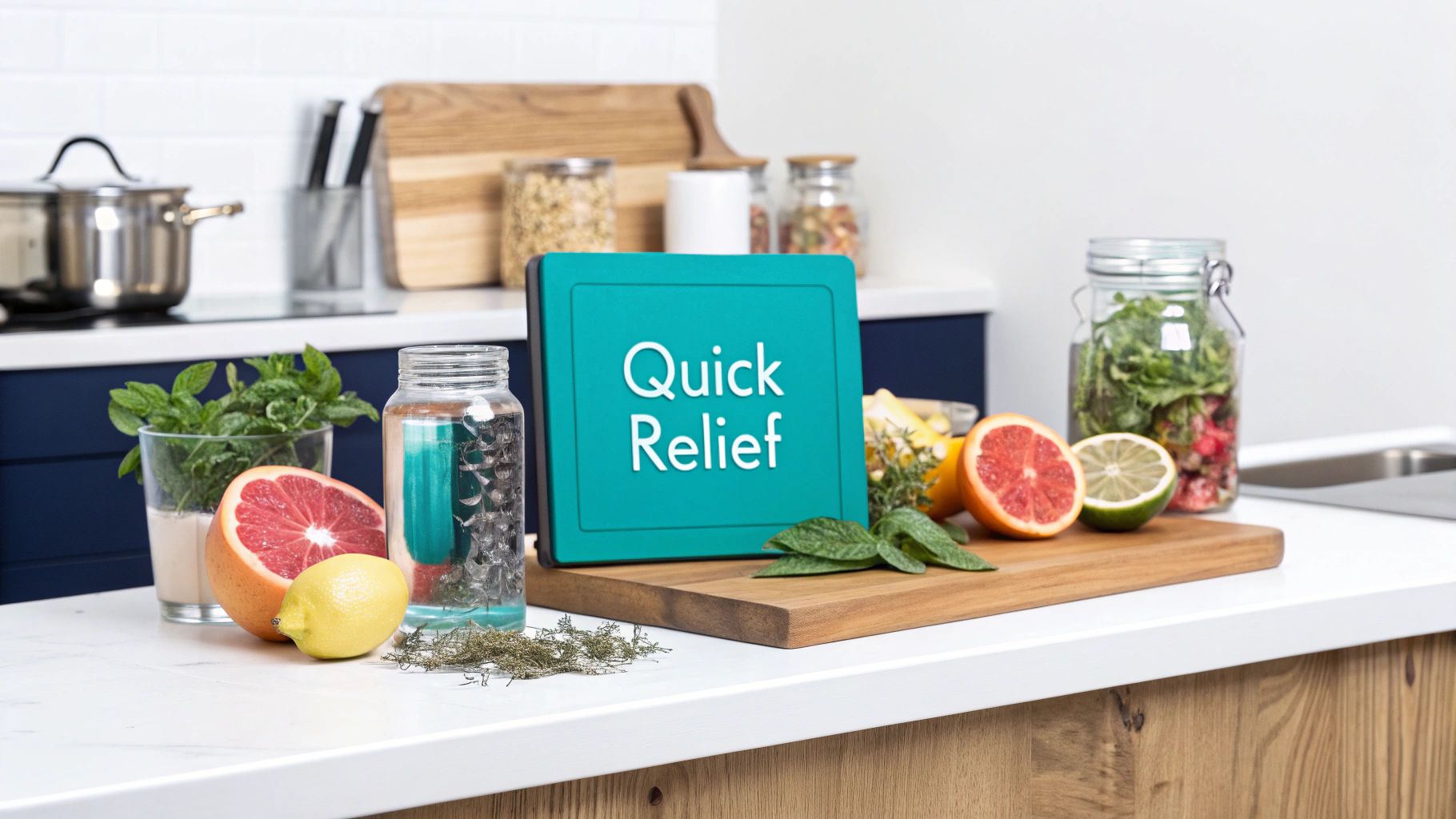

· By Annemarie
How Long Do Hangovers Last? Expert Recovery Tips
The Science Behind Hangover Duration: What to Expect

So, just how long do hangovers last? There's no single answer. The truth is, hangover duration is highly personal and depends on a mix of factors. This makes pinpointing exactly when you'll feel better a bit of a guessing game. However, a little understanding of the science behind hangovers can help you manage expectations and possibly ease some of the discomfort.
One reason for the variation in hangover length is how our bodies process alcohol. Alcohol is a diuretic, increasing urine production and leading to dehydration. This dehydration contributes to common hangover symptoms like headaches and dizziness. Alcohol also disrupts sleep, making matters worse.
Even after the alcohol is gone from your system, your body is still working to recover. Restoring electrolyte balance and repairing cellular damage takes time, which impacts the overall hangover duration. You might be interested in: How to master...
Hangovers can last anywhere from a few hours to over 24 hours after your last drink. Factors like how much you drank, your individual tolerance, and the type of alcohol all play a role. Symptoms typically worsen as your blood alcohol content (BAC) drops, peaking when your BAC nears zero.
For example, one study showed that hangover severity increases around 8 hours after drinking, peaking at 14 hours and gradually improving after that. This variability means some people experience shorter hangovers, while others might feel unwell for a full day or longer. Learn more here.
Understanding the Recovery Cycle
The hangover recovery cycle typically involves several stages. As your BAC falls, you may start to feel the first signs of discomfort – a mild headache or a touch of nausea. These early symptoms often intensify as your BAC gets closer to zero. This explains why sometimes you feel worst after you've sobered up.
But even after this peak, recovery continues. Your body works hard to rehydrate, restore electrolyte balance, and repair cell damage caused by alcohol. This process can take several hours, sometimes even a full day or more. This is why promises of a "quick recovery" are often unrealistic. While some symptoms may fade quickly, full recovery is a gradual process.
Why Your Hangovers Last Longer Than Your Friends'

Ever wake up after a night out feeling absolutely dreadful, while your friend seems perfectly fine? This disparity in hangover experiences isn't just anecdotal. A range of factors, from genetics and age to lifestyle choices, influence how long a hangover lasts and how severely you experience it. Understanding these variables can shed light on why your recovery might be significantly different from someone else's.
The Role of Biology
One key factor is biological sex. Women often experience more severe hangovers than men, even when accounting for body weight and the amount of alcohol consumed. This difference is partly due to variations in how men and women metabolize alcohol. Hormonal fluctuations can also play a role in hangover intensity.
Age is another important biological influence. As we get older, our bodies become less efficient at processing alcohol. This can lead to longer and more intense hangovers. Interestingly, the duration of hangovers can also vary significantly across different age groups.
Let's take a closer look at the average hangover duration across different generations in the following table.
Average Hangover Duration By Age Group Description: This table compares the average hangover duration across different generations, highlighting the influence of lifestyle, metabolism, and alcohol consumption habits on recovery times.
| Age Group | Average Hangover Duration (hours) | Common Factors |
|---|---|---|
| Gen Z | 5.36 | Faster metabolism, generally lower alcohol consumption per occasion |
| Millennials | 7.27 | Potentially higher stress levels, varying sleep patterns, higher average alcohol consumption |
| Baby Boomers | 6.10 | Slower metabolism, but generally more moderate and consistent drinking habits |
As you can see, Millennials report longer hangovers on average (7.27 hours) compared to both Gen Z (5.36 hours) and Baby Boomers (6.10 hours). This discrepancy suggests that factors like lifestyle, metabolism, and alcohol consumption habits all contribute to these differences. You can find more detailed information on this study from Shane Co.. Pre-existing health conditions, such as liver or kidney problems, can also impact the body's ability to process alcohol efficiently, further prolonging hangover duration.
Lifestyle and Drinking Habits
Beyond biology, lifestyle choices heavily influence how long a hangover lasts. Smoking, for example, exacerbates hangover symptoms because of the additional toxins introduced into the body. Poor sleep quality, both before and after drinking, can also worsen a hangover.
Your drinking habits also play a crucial role. Binge drinking, or consuming large amounts of alcohol in a short period, almost guarantees a longer and more severe hangover. The type of alcohol you choose matters, too. Darker liquors, like whiskey and rum, contain more congeners, chemicals that contribute to hangover severity.
Tolerance and Chronic Alcohol Use
Developing a tolerance to alcohol doesn't mean you avoid hangovers altogether. In fact, heavy drinkers often experience longer and more frequent hangovers, even with a higher tolerance. This is because chronic alcohol use can damage the liver and other organs, reducing their ability to process toxins effectively. Increased tolerance can also lead to consuming even larger quantities of alcohol, which only increases the likelihood of a severe and prolonged hangover. This underscores the importance of responsible drinking habits and being mindful of the potential long-term health risks of excessive alcohol consumption.
Tracking Your Hangover: When Each Symptom Peaks and Fades

Hangovers are truly the unwelcome guests of the party aftermath. They arrive unannounced and linger far too long. Interestingly, not all hangover symptoms follow the same pattern. Knowing when each symptom typically peaks and fades can be beneficial in managing the overall hangover experience and preparing for recovery. Let’s explore a detailed breakdown of common hangover symptoms and their timelines.
The Headache Phase
The dreaded hangover headache often makes its appearance as your blood alcohol content (BAC) starts to decline. The throbbing pain usually peaks when your BAC reaches zero. This unpleasant sensation is primarily caused by dehydration and the expansion of blood vessels in the brain.
While over-the-counter pain relievers like Tylenol can offer some temporary relief, proper hydration is crucial for effectively addressing this symptom. The headache typically improves within 4 to 12 hours, but it can unfortunately linger longer in some cases.
Nausea and Upset Stomach
For many, nausea is one of the most debilitating hangover symptoms. This queasiness often accompanies the headache and intensifies as BAC approaches zero. Alcohol is known to irritate the stomach lining, which, combined with dehydration, can lead to nausea and even vomiting.
These symptoms usually reach their peak within a few hours of waking up and generally subside within 24 hours. However, lingering discomfort is certainly possible, especially after a night of heavy drinking.
Fatigue and Cognitive Impairment
The "brain fog" and fatigue associated with hangovers can significantly impact cognitive function. Alcohol disrupts sleep patterns, resulting in exhaustion and difficulty concentrating. This feeling of mental sluggishness usually lasts for 8-24 hours.
Additionally, anxiety and mood disturbances can further worsen the sense of overall malaise. These emotional symptoms often peak later in the hangover process, sometimes lingering even after the physical symptoms have subsided. This can make it especially challenging to focus or think clearly.
Individual Variability in Hangover Duration
It’s important to note that hangover duration and severity vary greatly from person to person. Factors like age, genetics, and drinking habits all play a role in how a hangover manifests.
For instance, older adults may experience longer hangovers due to changes in metabolism. Similarly, individuals with certain genetic predispositions might be more susceptible to prolonged hangover symptoms.
A Symptom Timeline for Better Understanding
To better visualize the typical progression of a hangover, let's examine a detailed timeline of common symptoms. The following table provides a general overview:
Hangover Symptom Timeline: Detailed breakdown of common hangover symptoms and their typical duration
| Symptom | Typical Onset | Peak Intensity Time | Average Duration | Recovery Tips |
|---|---|---|---|---|
| Headache | As BAC falls | BAC of zero | 4-12 hours | Hydration, pain relievers |
| Nausea/Vomiting | Shortly after waking | A few hours after waking | Up to 24 hours | Bland foods, anti-nausea medication like Pepto-Bismol |
| Fatigue/Brain Fog | Upon waking | Throughout the day | 8-24 hours | Rest, hydration |
| Anxiety/Mood Changes | Later in the day | Varies | Up to 48 hours | Relaxation techniques, fresh air |
This table offers a general guide. Individual experiences may vary. Understanding these patterns can help you anticipate the course of your hangover and better manage your recovery.
While waiting it out is sometimes the only option, prioritizing hydration, rest, and managing individual symptoms can make the process more bearable. For additional tips on speeding up recovery, check out the Upside Hangover Sticks website. They offer a convenient and effective solution designed to help you live more, without the burden of a hangover.
The Hidden Cost of Hangover Time: Beyond Personal Suffering

While the throbbing headache and upset stomach are the most recognizable signs of a hangover, its impact reaches far beyond personal discomfort. Hangovers carry a hidden cost, affecting not only individuals but also workplaces and even public health. This cost appears in several ways, impacting productivity, workplace safety, and the overall health of the population.
The Economic Impact of Hangovers
One of the most significant hidden costs is the economic burden. Absenteeism and presenteeism (being at work but not fully productive) due to hangovers lead to substantial financial losses for businesses. Decreased productivity and missed workdays related to alcohol use contribute to billions of dollars in lost revenue annually.
Certain professions are more vulnerable to hangover-related issues. Industries requiring alertness and coordination, such as transportation and healthcare, are especially susceptible. Addressing alcohol-related issues in these sectors is vital to mitigate risks and improve overall workplace safety.
Hangovers aren't just a personal problem; they have broader implications. In the UK, the average person experiences two hangovers lasting around 36 hours each month, equivalent to a full year spent hungover over a lifetime. This prevalence highlights the public health implications of alcohol consumption. Excessive drinking can lead to long-term health problems and safety risks. Surveys show that a significant portion of the global population suffers from regular hangovers, stressing the need for responsible drinking and awareness of alcohol-related risks. Find more detailed statistics here. You might also be interested in additional pages from our sitemap.
The Public Health Perspective
Beyond the economic impact, hangovers are a significant public health concern. The normalization of "hangover culture" in media and social settings often minimizes the negative consequences of excessive alcohol consumption. This can delay recognizing problematic drinking patterns and seeking help for potential alcohol-related disorders.
Frequent hangovers can also indicate underlying health issues. Prolonged alcohol consumption can negatively impact gut health, potentially contributing to overall discomfort. To understand potential long-term effects, consider learning about signs and symptoms of poor gut health. Addressing the root causes of frequent or severe hangovers is crucial for improving individual well-being and reducing the burden on public health resources.
This broader perspective on hangovers goes beyond the individual experience. It helps us understand how personal choices regarding alcohol consumption have wider societal and economic repercussions. Recognizing these hidden costs emphasizes the importance of responsible drinking practices and promotes a deeper understanding of the complex relationship between alcohol and public health.
Recovery Accelerators: Evidence-Based Ways to Feel Better Faster
We've explored the science behind hangovers and why they impact everyone differently. But the biggest question remains: how can we bounce back quicker? This section separates fact from fiction, offering science-backed strategies to feel better faster. We'll explore practical tactics you can use immediately, plus clear guidance on when to seek medical advice.
Hydration: Beyond Just Water
Dehydration plays a significant role in hangover symptoms. While water is essential, replenishing electrolytes is equally important. Simply drinking lots of water may not be enough. Sports drinks or electrolyte-enhanced beverages can help restore the balance lost due to alcohol's diuretic effect. Natural options like coconut water are also excellent sources of electrolytes and can aid in rehydration.
Nutritional Support for Recovery
Certain foods can actually assist your liver in processing alcohol more efficiently. Focus on nutrient-rich choices that support liver function and help restore blood sugar. Think eggs, bananas, and oatmeal. These provide essential vitamins and minerals that can aid recovery. A balanced meal also helps stabilize blood sugar levels, which often fluctuate after drinking.
The Role of Rest and Sleep
Quality sleep is vital for hangover recovery. Alcohol disrupts sleep patterns, leading to fatigue and cognitive impairment. Prioritizing sleep after a night of drinking is essential for feeling better. Even a few extra hours can significantly impact recovery. Create a relaxing sleep environment and avoid caffeine or other stimulants before bed.
Medications and Supplements: What Really Works
Some over-the-counter pain relievers can address headache and muscle aches. However, certain medications can actually hinder recovery or interact negatively with alcohol. Consult a healthcare professional before using any medication for hangover symptoms. Some supplements show promise in reducing hangover severity, but discuss these with a doctor to ensure they are safe and appropriate for you. You might be interested in: More products in our sitemap.
A Personalized Recovery Framework
The most effective hangover recovery strategy is tailored to your individual symptoms and drinking habits. If you experience severe nausea, focus on bland foods and anti-nausea remedies. If headaches are your main concern, prioritize hydration and over-the-counter pain relievers. Understanding your body's response to different types of alcohol can help inform your choices in the future. This personalized approach helps you manage hangovers strategically and minimize their impact. Understanding how long hangovers last is just the beginning. Using these evidence-based strategies helps you take control and feel better faster. Always consult a healthcare professional if your symptoms are severe or persistent.
Never Again: Strategic Approaches to Prevent Extended Hangovers
After exploring the science and impact of hangovers, let's discuss how to minimize their occurrence and severity. This section offers proactive strategies to prevent those dreaded extended hangovers, empowering you to enjoy social occasions responsibly and wake up feeling refreshed.
Pre-Drinking Preparation: Setting the Stage for Success
Before you even take your first sip, you can take steps to mitigate the effects of alcohol. Start with a balanced meal. Eating before drinking helps slow alcohol absorption. Foods high in protein and healthy fats are particularly beneficial. Consider salmon with roasted vegetables or a chicken and avocado salad. These foods create a buffer in your stomach, preventing alcohol from being absorbed too quickly.
Hydration is also key. Start hydrating before you start drinking. This proactive approach establishes a healthy hydration baseline, minimizing the dehydrating effects of alcohol later.
Pacing and Moderation: The Art of Mindful Drinking
Once you start drinking, pacing is crucial. Avoid "chugging" or drinking too quickly. Sip your drinks slowly, giving your body time to process the alcohol. Spacing your drinks over a longer period minimizes the peak blood alcohol concentration, reducing the likelihood of a severe hangover.
Moderation is also essential. While keeping up with friends can be tempting, remember your limits. Knowing your body's tolerance is key to preventing a hangover. If you find yourself getting tipsy quickly, switch to non-alcoholic beverages. Maintaining social connections doesn't require excessive alcohol consumption.
Strategic Hydration During and After Drinking
Continuing to hydrate while drinking is as important as pre-drinking hydration. Alternate alcoholic beverages with water or non-sugary drinks. This consistent hydration helps offset the diuretic effects of alcohol, keeping your body hydrated throughout the night.
After you finish drinking, continue hydrating. A large glass of water before bed can significantly improve how you feel the next morning. If anxiety contributes to your hangovers, consider exploring natural remedies for anxiety.
Choosing Your Drinks Wisely: Congeners and Cocktail Composition
Not all alcoholic beverages are created equal. Congeners, chemicals produced during fermentation, contribute to hangover severity. Darker liquors like whiskey and rum contain higher levels of congeners than lighter liquors like vodka or gin. Choosing lighter-colored drinks might reduce hangover intensity.
Be mindful of sugary mixers. Sugary cocktails can lead to a "sugar crash" later, exacerbating hangover symptoms. Opt for low-sugar mixers or enjoy your spirits neat or on the rocks.
The Role of Supplements: Supporting Your Body's Recovery
Certain supplements might support your body's recovery process. B vitamins, for example, are depleted by alcohol consumption. Taking a B-complex vitamin before or after drinking may help replenish these essential nutrients. Consult with a healthcare professional before taking any new supplements.
Post-Drinking Recovery: Prioritizing Rest and Nutrition
Finally, after a night of drinking, prioritize rest and nutrition. Alcohol disrupts sleep, so even if you feel tired, you may not be getting quality rest. Aim for 7-8 hours of sleep to allow your body to recover.
Eat a nutritious breakfast the following morning. Foods rich in antioxidants and electrolytes can help replenish depleted nutrients. Avoid greasy or processed foods, which can further irritate your stomach.
By adopting these preventative strategies, you can significantly reduce the frequency and severity of your hangovers. Mindful drinking and proactive preparation empower you to enjoy social occasions responsibly and wake up feeling refreshed.
Ready to take control of your mornings after a night out? Upside Hangover Sticks are a convenient and effective way to counteract common hangover symptoms and support your body's natural recovery process. Try them today and experience the difference! Visit Upside Hangover Sticks to learn more and make hangovers a thing of the past.
